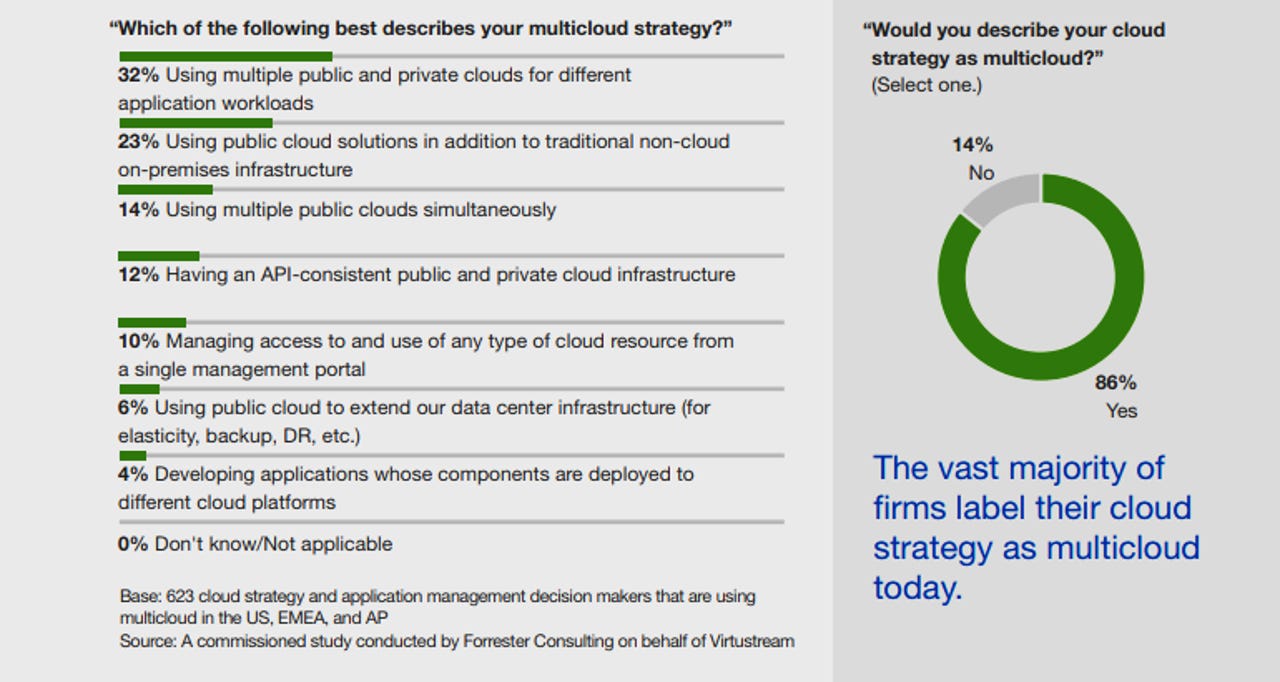Cloud computing strategies, in-demand programming skills, and cybersecurity concerns: Research round-up


Multicloud: Everything you need to know about the biggest trend in cloud computing
Let's start with our special feature on multicloud. As many as 86% of respondents (727 cloud strategy and application management decision makers in the US, EMEA and APAC) to research from Forrester and Virtustream characterise their organisations' cloud strategy as 'multicloud', identifying most with the description 'Using multiple public and private clouds for different application workloads'.
For more see: Multicloud: Everything you need to know about the biggest trend in cloud computing
Going for a multicloud approach
Most (58%) respondents to research from cloud analytics firm Kentik say their firm adopts a multicloud strategy. They either use at least two public cloud providers (40%) or all the 'big-three' providers (18%). Only a third (33%) are hybrid cloud users, with company-owned or colo/third-party data centres, as well as at least one cloud provider.
For more see: Multicloud: Everything you need to know about the biggest trend in cloud computing
Cloud spending becoming more concentrated among the big guns: AWS, Microsoft Azure, Google Cloud
Public cloud spending is increasingly being concentrated among the top five providers and the consolidation of wallet share is even more intense in infrastructure- and platform-as-a-service, according to IDC. The researcher reports that the top five public cloud providers account for 46.3% of all spending growth. In IaaS and PaaS, the top five vendors account for 63% of all spending.
For more see: Cloud spending becoming more concentrated among the big guns: AWS, Microsoft Azure, Google Cloud
Java and Python programming languages in demand as skills shortage worsens
Developers with skills in Java and Python programming languages remain among the toughest to find as the UK's skills shortage spreads beyond the capital. Almost two-thirds of CIOs say they are finding it hard to source the right staff, and this is increasingly an issue for companies beyond the capital, according to a survey by Harvey Nash and KPMG.
For more see: Java and Python programming languages in demand as skills shortage widens
The fastest-growing US city for tech pros is not where you think
Talent acquisition company iCIMS looked at the best places for tech jobs in the US. When looking for the cities with the largest percentage of year-on-year growth of tech job openings, Raleigh, NC tops the list with a 56.9% growth, followed by Omaha, NE at 56.6% growth. In Raleigh, the average cost for a home is just $260,100.
For more see: The fastest growing US city for tech pros is not where you think
Millennials focus on getting the job done - and tech helps
Research from Akumina suggests US millennial managers adopt technology wholeheartedly and use it to be more productive. Nine out of 10 (89%) feel positive about the productivity software their business uses, and 62% do not believe their workplace uses too many tech tools.
For more see: Three-quarters of US millennials believe job-hopping has helped advance their careers
Workers waste half their time as they struggle with data
Research from Alteryx and IDC shows that data workers spend 90% of their working week (around 36 hours) on data-related activities such as searching, preparation and analytics. Searching for and preparing data are the most common activities of the data worker role at 15% and 33% respectively. On average, they use four to seven different tools to perform data activities, adding to the complexity of the data and analytics process.
For more see: Workers waste half their time as they struggle with data
The collaborative inbox: Is it email's turn for innovation?
Businesses want to collaborate, according to research from IDC. Over half of companies (53%) cite project management as their primary use case for collaboration, followed by interdepartmental communications (44%) and product improvement (41%). Fewer than one in 10 users are considered to be 'passive' collaborators.
For more see: The collaborative inbox: Is it email's turn for innovation?
Phishing, ransomware are top cyberattacks on financial services firms
There's been a massive increase in the number of cyber incidents that are reported to the regulator by finance firms, according to audit and consulting firm RSM. The most common cause of an incident, perhaps reflecting the interconnected nature of IT infrastructure, is described as a 'third-party failure', which accounts for 21% of reports. Hardware and software issues are blamed for 19% and change management for 18%.
For more see: Phishing, ransomware are top cyberattacks on financial services firms
DMARC's abysmal adoption explains why email spoofing is still a thing
Companies around the world are still failing to see the benefits of Domain-based Message Authentication, Reporting & Conformance (DMARC), an email security protocol designed to prevent email spoofing. Around 79.7% don't use DMARC, according to a report from analytics firm 250ok, which surveyed the DMARC policies deployed with 21,075 business and government domains.
For more see: DMARC's abysmal adoption explains why email spoofing is still a thing
Smartphone shipments decline in Q2, but the market is stabilising
Worldwide smartphones shipments in Q2 declined 2.3% year over year, according to IDC. Vendors shipped a total of 333.2 million phones. While the overall smartphone market remains in decline, there are signs that it's stabilising. Shipments were actually up 6.5% over the previous quarter. Samsung, Huawei, and Apple maintained their positions as the top three vendors.
For more see: Smartphone shipments decline in Q2, but the market is stabilizing, IDC says
Most parents never check their children's devices
Children are spending, on average, three and a half hours on their smartphones every day, according to research from RS Components. But when asked, parents think their children only spend an average of one hour 18 minutes, a difference of over two hours. Parents preferred some technology platforms more than others. Almost one in six (14%) thought that YouTube was very appropriate for children, whereas only 2.4% felt the same about Twitch or Tumblr.
For more see: Most parents never check their children's devices